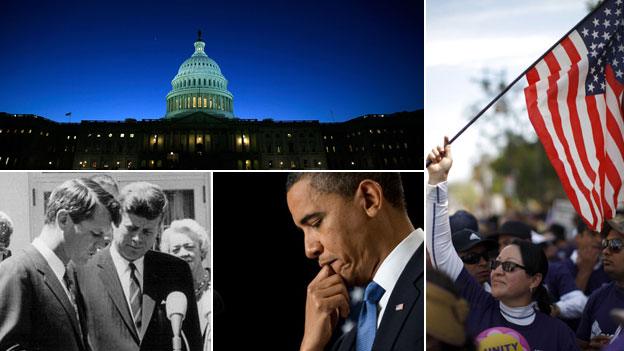US mid-terms: Will national security decide New Hampshire race?
- Published
In New Hampshire, Republican Senate candidate Scott Brown has gained some ground in the polls by focusing on national security issues like Ebola and Islamic State. But will that strategy work?
New Hampshire is a state where the Republican attempts to turn these congressional elections into a referendum on President Barack Obama run up against that stubborn old adage "all politics is local".
A close Senate race pits the first-term incumbent Jeanne Shaheen against Scott Brown, the former senator from neighbouring Massachusetts, who has crossed the state line in a bid to revive his political career.
Brown, a former colonel in the Army National Guard and a Republican hero for winning the 2010 special election to succeed the Democrat's great lion of the Senate, Ted Kennedy, is focusing on national security issues.
Appearing at a veterans' hall in Nashua this week, Brown called for President Obama to shut the border with Mexico and to issue clearer guidelines on Ebola.
To raucous applause, he also assailed the Obama administration for its sluggish response to the rise of Islamic State. A vote for him, he claimed, would be a vote to restore America's global leadership.
"If you want to change the direction of not only our state but our country, you want to make sure that our allies trust us, you want to make sure that our foes fear and respect us, because I want to be feared by our military," he said, in a slightly mangled soundbite.

Shaheen v Brown could be crucial to Senate control
With the race set for a photo-finish, Brown co-opted help from Senator John McCain, whose presence in the Granite State always has something of a favourite son feel, even though he hails from Arizona.
Twice the winner of the first-in-the-nation presidential primary, in 2000 and again in 2008, McCain looks upon New Hampshire veterans' halls as his natural political habitat. Small wonder. The one-time prisoner of war, who thundered through the state on his battle bus the Straight Talk Express, is revered here.
Reviving memories of the 2000 campaign, McCain started his short speech with his trademark military humour. The former Navy pilot deadpanned that he didn't join the Marines because he knew the identity of both his parents. But the laughing stopped when he lambasted the president, his much younger opponent in the 2008 presidential election, for a "feckless" foreign policy.
Afterwards, I asked him whether he truly thought that foreign policy could swing this close-fought Senate race.
"I think that the American people have become incredibly interested," he said. "We have seen the polling numbers as far as issues of importance to the American people, we've seen it jump from almost nothing to probably number two behind the economy. Yes, I believe it's an issue. When Americans see this hideous, grotesque [image of] Americans being beheaded, it gets the American people's attention and that's reflected in the polls, not just my opinion."
US campaign adverts target IS response
In New Hampshire, this foreign focus certainly appears to have altered the race. A few months back, Shaheen looked like a shoo-in for a second term. In recent weeks, the polls have narrowed and the all-important late momentum appears to be with Brown.
Yet for all the attempts to nationalise and internationalise the New Hampshire race, there is also a distinctly local flavour. Jeanne Shaheen, the first female senator in the state's history, is a former governor who won a hat-trick of gubernatorial elections. Though born in Missouri, she moved to New Hampshire in the early 1970s, and first won a seat in the state Senate almost 25 years ago.
Seeking to tap into feelings of intense New Hampshire pride exemplified by its famed motto "Live free or die," she is casting Brown, who only moved to the state last year, as an opportunistic outsider - what Americans call a carpetbagger. Not only that, she is portraying him as a Massachusetts reject. Brown, remember, was defeated in the 2012 Senate race by the Democrat Elizabeth Warren.
For his part, Brown is also trying to appeal to another strand of New Hampshire thinking, its fierce sense of independence. Shaheen, he says, is rigidly partisan, a Democrat who supports the president 99% of the time. He would be more free-thinking.
A small state that has long had a disproportionate say about who ends up in the White House will also be crucial in determining which party controls the Senate. And ultimately this race could hinge on who has the biggest negatives: Scott Brown or Barack Obama.
- Published27 October 2014

- Published21 October 2014